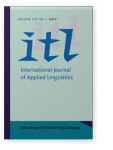Vol. 170:1 (2019) ► pp.3–23
Effects of task repetition on EFL oral performance
Considerable research has examined the effects of task repetition (TR) on second language (L2) performance. While results are still inconclusive, some patterns are emerging. However, limited attention has been paid to L2 learners’ perceptions of TR. This paper reports a study in which 40 English as a foreign language (EFL) learners were asked to repeat a task after a three-day interval; on both occasions they performed the task immediately after receiving instructions. Results indicated that TR triggered more complex and fluent, but less accurate, narratives. In post-task interviews, the majority of learners expressed positive attitudes towards TR, purporting that familiarity increased confidence. This paper will finally discuss the possible pedagogical implications of the study for EFL teaching.
Article outline
- Introduction
- Empirical background to the study
- The study
- Research questions
- Research participants
- Task
- Research design
- Procedure
- Measures
- Data analysis
- Results
- Complexity
- Accuracy
- Fluency
- EFL Learners’ perceptions of TR
- Discussion
- Limitations and recommendations for further research
- Pedagogical implications
- Conclusion
-
References
